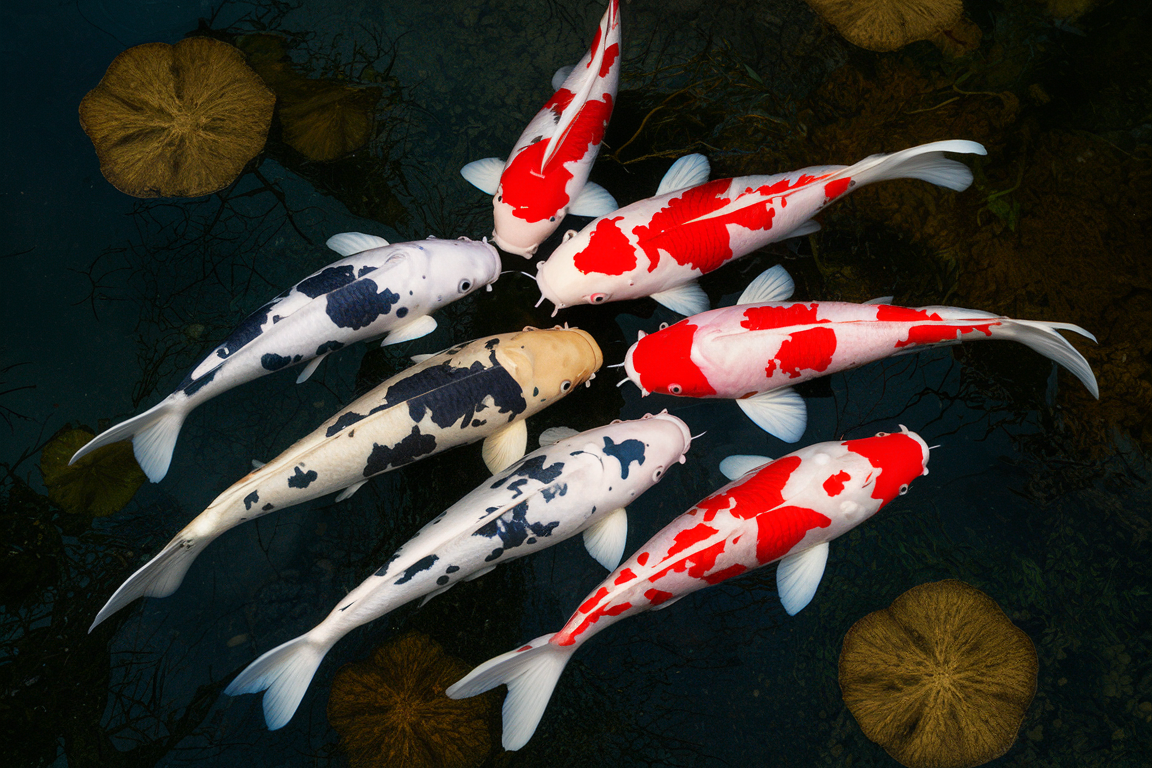Koi fish, with their vibrant colors and graceful movements, are a captivating addition to any pond or water garden. But beyond their aesthetic appeal lies a fascinating world of koi fish behavior, a complex tapestry of instincts, social interactions, and responses to their environment. Understanding this behavior is key to providing optimal care and creating a thriving environment for these captivating creatures. Let’s follow Love My Koi!
The Natural Instincts of Koi Fish: From Survival to Socialization

Koi fish, like all living creatures, are driven by a set of natural instincts that guide their actions and interactions. These instincts are rooted in their evolutionary history and serve to ensure their survival and well-being.
1. Schooling Behavior:
- Characteristics: Koi are naturally social creatures and exhibit strong schooling behavior. They tend to gather in groups, especially when feeling threatened or uncertain. This behavior provides safety in numbers, as predators are less likely to target a large school of fish.
2. Feeding Behavior:
- Characteristics: Koi are omnivores and have a diverse diet that includes algae, insects, and plant matter. They are opportunistic feeders and will readily consume any food that comes their way. Their feeding behavior is often influenced by the availability of food, water temperature, and the presence of other koi.
3. Territorial Behavior:
- Characteristics: While generally social, koi can exhibit territorial behavior, especially during breeding season or when resources are scarce. Dominant koi may establish territories within the pond, defending their space from other koi.
4. Breeding Behavior:
- Characteristics: Koi are egg-laying fish and exhibit a complex breeding behavior. Males often display elaborate courtship rituals, chasing females and releasing sperm to fertilize eggs. The breeding season typically occurs in spring or early summer when water temperatures are warm.
Factors Influencing Koi Fish Behavior: The Environment Matters
The environment in which koi live plays a crucial role in shaping their behavior. Factors like water quality, pond size, and the presence of other fish can all influence their interactions and actions.
1. Water Quality:
- Impact: Poor water quality can lead to stress, disease, and even death in koi. High levels of ammonia, nitrite, and nitrate can disrupt their normal behavior, making them more lethargic and less active.
2. Pond Size:
- Impact: A spacious pond provides ample room for koi to swim, explore, and interact with each other. A cramped pond can lead to stress, aggression, and competition for resources.
3. Presence of Other Fish:
- Impact: The presence of other fish, particularly aggressive species, can influence koi behavior. Koi may become more timid or withdrawn if they feel threatened by other fish.
4. Food Availability:
- Impact: Food availability can significantly impact koi behavior. Koi that are well-fed are typically more active and social, while those that are underfed may become more aggressive and territorial.
5. Temperature:
- Impact: Koi are ectotherms, meaning their body temperature is regulated by their environment. Water temperature can significantly impact their activity levels and behavior. In cooler temperatures, koi become less active, while in warmer temperatures, they become more energetic and social.
Understanding Koi Behavior: A Window into Their World
By understanding the natural instincts of koi fish and the factors that influence their behavior, we can create a more harmonious and enriching environment for them. Observing their interactions and responses to their surroundings can provide valuable insights into their well-being and help us address any potential issues.
Frequently Asked Questions About Koi Fish Behavior
1. Why do koi fish school?
Koi fish school for safety in numbers, as predators are less likely to target a large group of fish.
2. How do I know if my koi are stressed?
Signs of stress in koi include lethargy, loss of appetite, hiding, and aggression.
3. What is the best way to feed my koi?
Koi should be fed a balanced diet of high-quality koi pellets, vegetables, and occasional treats.
4. How can I encourage my koi to breed?
To encourage breeding, provide a suitable pond environment with ample hiding places and a stable water temperature.
5. What are some common koi fish diseases?
Common koi fish diseases include fin rot, ich, and parasites.
Conclusion: A World of Fascinating Interactions
Koi fish behavior is a complex and fascinating aspect of their aquatic world. By understanding their natural instincts, the factors that influence their behavior, and the signs of stress, we can provide optimal care and create a thriving environment for these captivating creatures. Observing their interactions and responses to their surroundings can provide valuable insights into their well-being and help us ensure their continued health and happiness.

Related Posts
Koi Fish and Goldfish Combined: A Unique Aquatic Experience
How Often to Feed Koi Fish: A Guide to Healthy Eating Habits
Koi Farm Breeding Guide: Unlocking the Secrets of Breeding Beautiful Koi